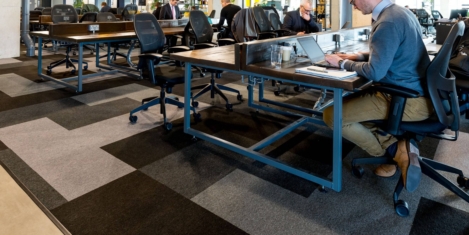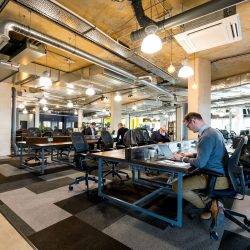July 17, 2018
Artificial intelligence will create more jobs than it displaces, claims new study
 Artificial Intelligence (AI) and related technologies are projected to create as many jobs as they displace in the UK over the next 20 years, according to new analysis by PwC. In absolute terms, around 7 million existing jobs could be displaced, but around 7.2 million could be created, giving the UK a small net jobs boost of around 0.2 million. While the overall net effect of AI on UK jobs may be broadly neutral, this varies significantly across industry sectors. The most positive effect of AI is seen in the health and social work sector, where PwC estimates that employment could increase by nearly 1 million, equivalent to around 20 percent of existing jobs in the sector. On the other hand, PwC estimates the number of jobs in the manufacturing sector could be reduced by around 25 percent, representing a net loss of nearly 700,000 jobs.
Artificial Intelligence (AI) and related technologies are projected to create as many jobs as they displace in the UK over the next 20 years, according to new analysis by PwC. In absolute terms, around 7 million existing jobs could be displaced, but around 7.2 million could be created, giving the UK a small net jobs boost of around 0.2 million. While the overall net effect of AI on UK jobs may be broadly neutral, this varies significantly across industry sectors. The most positive effect of AI is seen in the health and social work sector, where PwC estimates that employment could increase by nearly 1 million, equivalent to around 20 percent of existing jobs in the sector. On the other hand, PwC estimates the number of jobs in the manufacturing sector could be reduced by around 25 percent, representing a net loss of nearly 700,000 jobs.













 Built environment organisations are calling for urgent action on issues such as consumption, innovation and infrastructure to prevent the UK slipping behind other nations on poverty, equality and the environment as a new report released today (3 July 2018) highlights the UK’s inadequate performance against the United Nations Sustainable Development Goals (SDGs), including those for the built environment. The report, Measuring up, from the UK Stakeholders for Sustainable Development (UKSSD), is the first comprehensive assessment of the UK’s performance against all 17 SDGs and highlights a significant danger that quality of life in the UK will worsen if action is not taken. Just some of the findings of the report include; that the UK is performing well (green) on only 24 percent of its targets; no industry, innovation and infrastructure targets have achieved a ‘good’ performance rating, with gaps in policy coverage and inadequate or deteriorating performance and large scale, sustained investment in replacing ageing infrastructure and creating additional resilient and low carbon infrastructure of all kinds is required.
Built environment organisations are calling for urgent action on issues such as consumption, innovation and infrastructure to prevent the UK slipping behind other nations on poverty, equality and the environment as a new report released today (3 July 2018) highlights the UK’s inadequate performance against the United Nations Sustainable Development Goals (SDGs), including those for the built environment. The report, Measuring up, from the UK Stakeholders for Sustainable Development (UKSSD), is the first comprehensive assessment of the UK’s performance against all 17 SDGs and highlights a significant danger that quality of life in the UK will worsen if action is not taken. Just some of the findings of the report include; that the UK is performing well (green) on only 24 percent of its targets; no industry, innovation and infrastructure targets have achieved a ‘good’ performance rating, with gaps in policy coverage and inadequate or deteriorating performance and large scale, sustained investment in replacing ageing infrastructure and creating additional resilient and low carbon infrastructure of all kinds is required.


 The digital era, ageing populations, skills shortages, and unpredictable political and economic contexts are persuading multinationals to focus more on mobile talent, new ways of working and assessing the cost of expatriate packages for international employees that are critical to the future of work. This is according to Mercer’s 24th annual Cost of Living Survey which reveals that factors such as instability of housing markets and fluctuating inflation, currencies and prices for goods and services, are impacting the cost of doing business in various cities around the world. UK cities have significantly risen in the ranking this year.
The digital era, ageing populations, skills shortages, and unpredictable political and economic contexts are persuading multinationals to focus more on mobile talent, new ways of working and assessing the cost of expatriate packages for international employees that are critical to the future of work. This is according to Mercer’s 24th annual Cost of Living Survey which reveals that factors such as instability of housing markets and fluctuating inflation, currencies and prices for goods and services, are impacting the cost of doing business in various cities around the world. UK cities have significantly risen in the ranking this year. 
 There is a critical need for to simplify the regulatory framework designed to improve energy efficiency in commercial buildings finds a recent report from the Environmental Industries Commission (EIC) Carbon Management & Sustainable Buildings Working Group. It also suggests that Brexit could act as a spur to rethink the right combination of policies to reform enforcement systems. The report, Improving non-domestic energy efficiency after Brexit, one of a series EIC is publishing setting out its members’ views on the impact of Brexit on environmental policy and how policy should evolve after the UK leaves the EU, covers the breadth of energy efficiency policy for non-domestic buildings. As part of its research, EIC surveyed England’s local authorities, who have responsibility for trading standards, finding that out of those that responded (122 out of 149), no local authorities have been issuing fines for failing to display Energy Performance Certificates or Display Energy Certificates.
There is a critical need for to simplify the regulatory framework designed to improve energy efficiency in commercial buildings finds a recent report from the Environmental Industries Commission (EIC) Carbon Management & Sustainable Buildings Working Group. It also suggests that Brexit could act as a spur to rethink the right combination of policies to reform enforcement systems. The report, Improving non-domestic energy efficiency after Brexit, one of a series EIC is publishing setting out its members’ views on the impact of Brexit on environmental policy and how policy should evolve after the UK leaves the EU, covers the breadth of energy efficiency policy for non-domestic buildings. As part of its research, EIC surveyed England’s local authorities, who have responsibility for trading standards, finding that out of those that responded (122 out of 149), no local authorities have been issuing fines for failing to display Energy Performance Certificates or Display Energy Certificates.
 Business Secretary Greg Clark proposed new laws in Parliament yesterday (June 11th) that new large firms will have to justify their chief executives’ salaries and reveal the gap to their average UK worker. It means that for the first time, UK listed companies with more than 250 UK employees will have to disclose and explain this difference – known as ‘pay ratios’ – every year. However, according to data published today by the Chartered Management Institute (CMI) and
Business Secretary Greg Clark proposed new laws in Parliament yesterday (June 11th) that new large firms will have to justify their chief executives’ salaries and reveal the gap to their average UK worker. It means that for the first time, UK listed companies with more than 250 UK employees will have to disclose and explain this difference – known as ‘pay ratios’ – every year. However, according to data published today by the Chartered Management Institute (CMI) and 














June 17, 2018
Fathers Day offers a chance to ponder the disadvantages faced by many working dads
by Julia Waltham • Comment, Flexible working, Wellbeing
(more…)